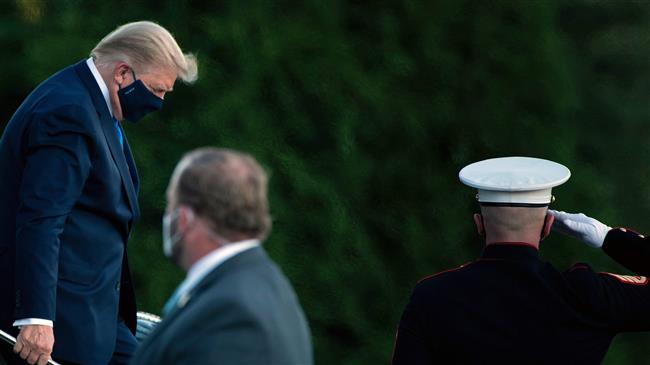US President Donald Trump is taken to a military hospital less than 24 hours after testing positive for COVID-19.
Publish dateSaturday 3 October 2020 - 11:15
Story Code : 219981
Trump arrived by helicopter at the hospital outside Washington on Friday, where he will stay for "the next few days" for the virus treatment.
The White House said the decision to transport Trump to Walter Reed National Military Medical Center was taken “out of an abundance of caution.”
It said Trump was feeling fatigued but in good spirits.
"At the recommendation of his physician and medical experts, the president will be working from the presidential offices at Walter Reed for the next few days," White House Press Secretary Kayleigh McEnany said.
In a video posted on Twitter before heading to the hospital, Trump said he was “doing very well.”
"I am going to Walter Reed hospital. I think I am doing very well. But we are going to make sure that things work out," Trump said. "The First Lady is doing very well.”
However, Trump didn’t talk to reporters before boarding the helicopter.
Democratic presidential nominee Joe Biden said Trump’s contracting of the virus is a bracing reminder that the disease has to be taken seriously.
Trump announced on Thursday night that he and his wife Melania had tested positive for COVID-19 and were going into quarantine, just a month ahead of the presidential election.
Trump is at a high risk for a severe infection due to his advanced age and being overweight, according to reports.
Trump, who is 74-year-old, is five times more likely to get hospitalized and 90 times more likely to die from the virus complications than someone between the age of 18 and 29, according to the Centers for Disease Control and Prevention (CDC).
Eight out of 10 coronavirus-related deaths reported in the United States have been among people aged 65 and older, The Hill reported.
In June, the White House announced Trump weighed 244 pounds (110.6 kilograms) at 6 feet 3 inches tall, giving him a body mass index (BMI) of just over 30. Obesity is defined as having a BMI of 30 or higher.
Obesity is one of the main underlying conditions that increases the risk of severe illness from COVID-19 and may triple the risk of hospitalization.
According to a study published in Nature, older men appear to be up to twice as likely to die from COVID-19 complications compared to women of the same age.
The White House said the decision to transport Trump to Walter Reed National Military Medical Center was taken “out of an abundance of caution.”
It said Trump was feeling fatigued but in good spirits.
"At the recommendation of his physician and medical experts, the president will be working from the presidential offices at Walter Reed for the next few days," White House Press Secretary Kayleigh McEnany said.
In a video posted on Twitter before heading to the hospital, Trump said he was “doing very well.”
"I am going to Walter Reed hospital. I think I am doing very well. But we are going to make sure that things work out," Trump said. "The First Lady is doing very well.”
However, Trump didn’t talk to reporters before boarding the helicopter.
Democratic presidential nominee Joe Biden said Trump’s contracting of the virus is a bracing reminder that the disease has to be taken seriously.
Trump announced on Thursday night that he and his wife Melania had tested positive for COVID-19 and were going into quarantine, just a month ahead of the presidential election.
Trump is at a high risk for a severe infection due to his advanced age and being overweight, according to reports.
Trump, who is 74-year-old, is five times more likely to get hospitalized and 90 times more likely to die from the virus complications than someone between the age of 18 and 29, according to the Centers for Disease Control and Prevention (CDC).
In June, the White House announced Trump weighed 244 pounds (110.6 kilograms) at 6 feet 3 inches tall, giving him a body mass index (BMI) of just over 30. Obesity is defined as having a BMI of 30 or higher.
Obesity is one of the main underlying conditions that increases the risk of severe illness from COVID-19 and may triple the risk of hospitalization.
According to a study published in Nature, older men appear to be up to twice as likely to die from COVID-19 complications compared to women of the same age.
Source : Afghan Voice Agency(AVA)
avapress.net/vdcjohe8vuqevhz.92fu.html
Tags
Top hits







